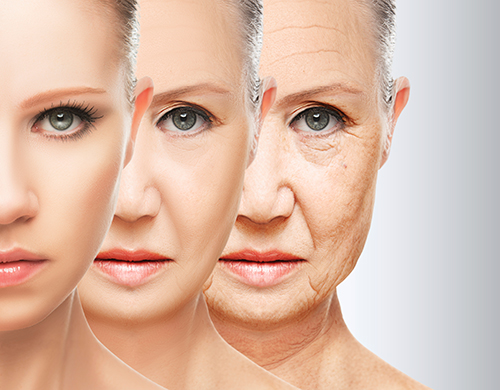![Measurements taken from 4,704 participants in the Long Life Family Study have been subjected to a form of systems analysis, a Big Data evaluation focusing on 19 blood biomarkers known to change with age and associated with inflammatory, hematological, metabolic, hormonal, and kidney functions. Ultimately, 26 biomarker signatures were identified, some associated with successful aging, others associated with a higher risk of specific age-related medical conditions. [iStock/evgenyatamanenko]](https://genengnews.com/wp-content/uploads/2018/08/Apr12_2016_iStock_48166144_Agingjpg1731941791-1.jpg)
Measurements taken from 4,704 participants in the Long Life Family Study have been subjected to a form of systems analysis, a Big Data evaluation focusing on 19 blood biomarkers known to change with age and associated with inflammatory, hematological, metabolic, hormonal, and kidney functions. Ultimately, 26 biomarker signatures were identified, some associated with successful aging, others associated with a higher risk of specific age-related medical conditions. [iStock/evgenyatamanenko]
Just one biomarker—say, a protein found in the blood—won’t tell you whether you will enjoy disease-free aging or suffer dementia, type 2 diabetes, or some other age-related disease. Two or three biomarkers might not be enough, either. But 19 might suffice. That’s how many biomarkers figured into a panel developed by scientists based at the Boston University Medical Center. According to these scientists, the ups and downs of these 19 biomarkers settle into 26 different signatures of aging—some of which auger well, and some of which are associated with higher risks for frailty, morbidity, and mortality.
This predictive exercise relies not on divination, but Big Data, a systems analysis approach. It was used by the Boston University team to simultaneously integrate multiple biological markers that vary with age, including markers specific for inflammatory, hematological, metabolic, hormonal, or kidney functions.
The approach was described in a study that appeared January 6 in the journal Aging Cell, in an article entitled, “Biomarker Signatures of Aging.” “The intuition of the approach,” the article’s authors wrote, “is that in a sample of individuals of different ages, there will be an ‘average distribution’ of these circulating biomarkers that represents a prototypical signature of average aging. Additional signatures of biomarkers that may correlate to varying aging patterns, for example, disease-free aging, or aging with increased risk for diabetes or cardiovascular disease (CVD), will be characterized by a departure of subsets of the circulating biomarkers from the average distribution.”
The researchers used biomarker data collected from the blood samples of almost 5000 participants in the Long Life Family Study (LLFS), funded by the National Institute on Aging (NIA) at the National Institutes of Health (NIH). They found that a large number of people—about half—had an average pattern, or signature. But smaller groups of people had specific patterns of biomarkers that deviated from the norm and that were associated with increased probabilities of association with particular medical conditions, levels of physical function, and mortality risk 8 years later.
“To test whether these signatures were associated with differences in biological aging, we correlated them with longitudinal changes in physiological functions and incident risk of cancer, cardiovascular disease, type 2 diabetes, and mortality using longitudinal data collected in the LLFS,” the authors explained. “Signature 2 was associated with significantly lower mortality, morbidity, and better physical function relative to the most common biomarker signature in LLFS, while nine other signatures were associated with less successful aging.”
The authors noted that the predictive values of seven signatures were replicated in an independent dataset from the Framingham Heart Study, which showed comparable significant effects, and an additional three signatures showed consistent effects. The authors also indicated that their analysis “sets the stage for a molecular-based definition of aging that leverages information from multiple circulating biomarkers to generate signatures associated with different mortality and morbidity risk,” adding that further research is needed to better characterize the signatures.
The study was led by Paola Sebastiani, Ph.D., professor of biostatistics at the Boston University School of Public Health, and Thomas Perls, M.D., professor of medicine at the Boston University School of Medicine.
“Many prediction and risk scores already exist for predicting specific diseases like heart disease,” Dr. Sebastiani said. “Here, though, we are taking another step by showing that particular patterns of groups of biomarkers can indicate how well a person is aging and his or her risk for specific age-related syndromes and diseases.” Dr. Perls added that the study is an example of the usefulness of Big Data and the emerging research fields of proteomics and metabolomics.
“We can now detect and measure thousands of biomarkers from a small amount of blood, with the idea of eventually being able to predict who is at risk of a wide range of diseases—long before any clinical signs become apparent,” explained Dr. Perls.
Dr. Sebastiani pointed out that the analytic methods used in the current study could make studies of drug and other medical interventions to prevent or delay age-related diseases much more plausible, since clinical trials “may not have to wait years and years for clinical outcomes to occur.” Instead, trials may be able to rely on biomarker signatures much earlier “to detect the effects, or absence of effects, that they are searching for.”
Drs. Sebastiani and Perls said that researchers are just beginning to break ground on the usefulness of biomarker signatures. “Following all the recent advances in genetics, the science of proteomics and metabolomics is the next big revolution in predictive medicine and drug discovery,” Dr. Perls predicted.






